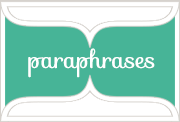First off, happy Thanksgiving :) I have found a place that is not perpetually raining to celebrate it, and will post pictures when I am home again :)
For now, as promised, I am going to elaborate more on my previous post. If you remember, I stated three basic principles that we have found helped us allocate our money wisely. They were:
1. Figuring out how much you need to live on each month. In other words, creating a budget.
2. Living one month ahead of your needs.
3. Creating a slush fund for variable income. I.e. Turning inconsistent income into a salary.
1. CREATING A BUDGET: (This one will take more than one post to explain. But we'll start here.)
The first of the three steps I listed is to figure out how much you need to live on each month. What is your budget? What categories do you need?
Categories aren't set in stone. Our budget continually gets modified as our needs change. For example, we used to have three categories for debt - credit card, personal debt, and student loans. As debt is eliminated, so are those categories. They are replaced now by things like savings, extra money for mortgage anniversary payment, etc.
Some people like to have just a few categories that encompass a lot of things. For example, they may have "Food" as one category. This could include groceries, toiletries, eating out, ordering pizza, getting slushies at 7-11, etc. We prefer to micromanage a lot more than that, so we have a good idea of exactly where our money is going. It is also good to have a more exact idea of how money is spent if you share a bank account.
Nick and I would never dream of having a separate bank account, though I know lots of husbands and wives do. We are in this thing (marriage) for the long haul and divorce is not an option for us. We are two people sharing life together until death does us part, so there is no reason why our finances should not be shared as well. But THAT is a whole blog in and of itself, so I digress.
The first thing you need to do may seem obvious to those familiar with budgeting. However, for those just starting out, bear with me while I state what is obvious to you :) You need to figure out your "fixed" expenses. These are the expenses that you HAVE TO PAY no matter what. Rent = fixed expense. Clothing = not so much. Both rent and clothing are important, but the difference is, one you can't "pass" on for a month if you wanted to, and the other you could.
EXAMPLES FIXED EXPENSES
Rent (OR, if you own: Mortgage, strata fees, property insurance, property taxes, sewage/water).
Utilities
Bank Fees
Transit Pass / Car Insurance
Internet
Phones
Credit Card Payment
Student Loan
Life Insurance
Tithe (obviously not if you aren't a Christian)
Now, there are some things in life that are a necessity, but are not completely "fixed" - i.e. you can control greatly how much you spend on them. Let's call these variable expenses.
VARIABLE EXPENSES
Gas
Food
Toiletries
Clothes
Haircuts
Long-Term Savings (for emergencies and the future)
The last category we'll call discretionary expenses. These are the ones that you really can live without, but are really nice to have. It will be the easiest if I just give you what we have for examples:
DISCRETIONARY EXPENSES
Nick's "Allowance" (spending money that he can do whatever he wants with without me caring)
Laura's "Allowance" (spending money that I can do whatever I want with without Nick caring)
Entertainment (when we go out together, or together with friends)
Discretionary (in case we run out of money in another category and need to top it off, or in case of unforeseen expenses)
Car Repairs (we have a separate category for this apart from savings)
Netflix (or cable t.v.)
Giving (separate from tithing)
Gifts
Short-Term Savings (we mainly use this to save up to visit family or travel)
Mortgage Savings (we are allowed to pay extra money towards our mortgage principal once a year so we set aside extra money for this throughout the year, though this could also count as savings for a downpayment, if you are looking to own in the future).
When making your budget, allocate money to the Fixed Expenses first, then to the Variable expenses and IF you have some left over, then you can create Discretionary Expenses. I will spend some time in my next blog post explaining how to decide how much money to allocate to each of the non-fixed expense categories and also tips on how to save money in each category (even in the fixed expenses categories).





No comments:
Post a Comment